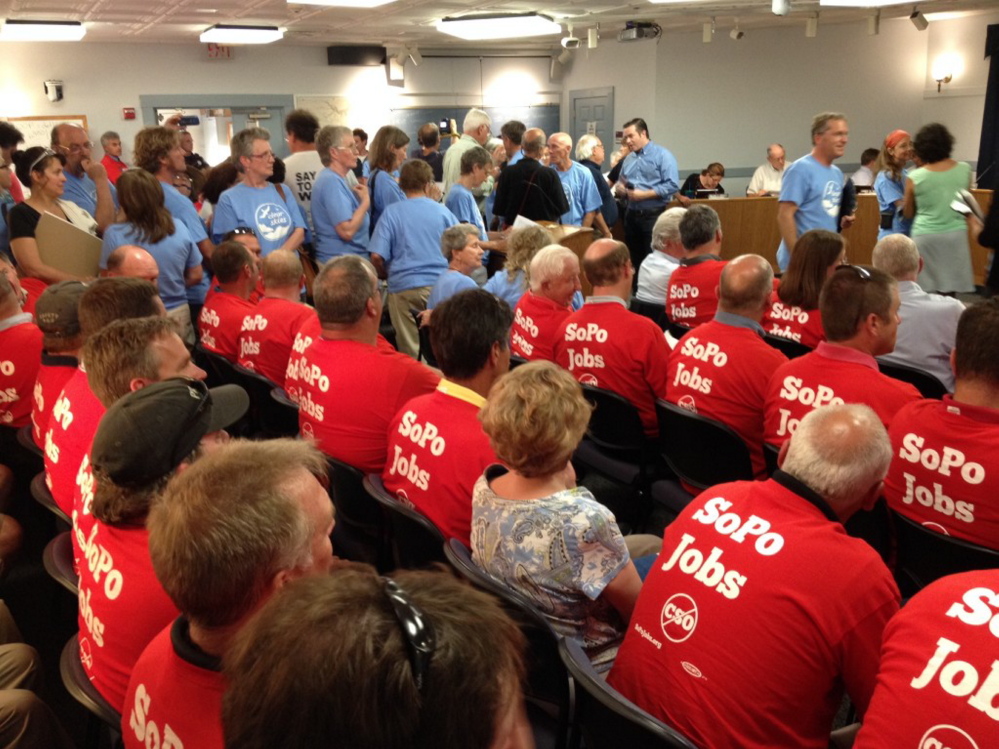SOUTH PORTLAND — Growing tension over a proposal that would block tar sands oil from coming into the city has raised the specter of future court challenges and a repeal referendum campaign if the City Council approves the measure.
The escalating controversy became obvious Monday evening, when supporters and opponents, each side wearing distinctive T-shirts, packed the council’s chamber for its first scheduled debate and vote on the proposal from the Draft Ordinance Committee.
More than 200 people showed up for the City Hall meeting, eclipsing the chamber’s 100-person fire-safety limit and forcing the council to move the meeting to 7 p.m. Wednesday in the gym at the South Portland Community Center.
The ordinance committee found that loading crude oil onto a ship could increase air pollution and that the vapor combustion facilities needed to mitigate the problem would have a negative visual impact on the waterfront.
The committee’s proposal would prohibit loading crude oil in bulk onto marine tank vessels and block construction or expansion of terminals and other facilities for that purpose. It wouldn’t impact current uses or the handling of gasoline, diesel, biodiesel, ethanol, kerosene, No. 2 fuel oil, jet fuel, aviation gasoline, home heating oil, asphalt, distillate, waste oil, lubricants, or other refined petroleum products.
While supporters say the committee’s proposal has a narrower scope than the Waterfront Protection Ordinance that city voters rejected last November, opponents say it goes well beyond the council’s original charge to target tar sands oil and threatens future terminal operations and jobs.
If the council passes the proposal as written, “the men and women of the Working Waterfront Coalition will seriously consider initiating our own local referendum campaign to repeal the ordinance in November, regardless of whether there is an active legal challenge,” said Jamie Py, president of the Maine Energy Marketers Association, in a written statement on Tuesday.
Opponents, including oil companies and the Portland Pipe Line Corp., say the proposal would exclude South Portland if domestically produced crude were allowed to be exported in the future, and it signals a long-term goal to constrain and dismantle all marine terminal operations in the city.
Supporters say the proposal is written to target tar sands oil from Canada and note that it’s currently illegal to export U.S. crude oil.
Members of Protect South Portland, a group that supports the proposal, have discussed the possibility that opponents may challenge the ordinance changes in court or initiate a referendum campaign if the council approves the measure, said spokeswoman Mary Jane Ferrier.
“We’re trying to keep our focus on what’s going on right now,” Ferrier said in a phone interview. “We have talked about what (the opposition’s) response might be. Back then, people didn’t think (a referendum) would happen. But that was before what happened (Monday) night.”
On Monday evening, the council chamber overflowed with supporters wearing light blue “clear skies” T-shirts and opponents wearing red T-shirts with American flags that touted “American Energy” and “SoPo Jobs.”
Councilors said their meetings rarely draw such a crowd. However, about 200 people, many of them wearing “clear skies” T-shirts, turned out two weeks ago when the ordinance committee formally presented its proposal to the council in the auditorium at Mahoney Middle School.
At that meeting, Mayor Gerard Jalbert joined several councilors in praising the committee’s work and said that naming the committee to develop a new proposal was the best way to avoid another divisive referendum.
Tar sands, also known as oil sands, are a mixture of sand, sticky raw petroleum and water. Environmental groups involved in the “clear skies” campaign say tar sands oil is more dangerous to ship through pipelines and more difficult to clean up if spilled. Members of the oil industry dispute those claims, saying that any restrictions are unjustified.
The Waterfront Protection Ordinance was a citizens initiative that also was designed to prevent Portland Pipe Line from bringing tar sands oil into the city using an underground pipeline that now carries crude from South Portland to Montreal. The defeated ordinance also would have blocked expansion of petroleum-related facilities on the waterfront.
Residents rejected that proposal by fewer than 200 votes, leading the council to conclude that the community had strong concerns about tar sands oil. The council enacted a moratorium on tar sands-related development and created a committee to address the issue through ordinance amendments. That committee met 19 times for about 60 hours total.
The council is expected to take an initial vote on the proposal Wednesday, followed by a Planning Board review July 15 and a final vote by the council July 21.
Send questions/comments to the editors.



Success. Please wait for the page to reload. If the page does not reload within 5 seconds, please refresh the page.
Enter your email and password to access comments.
Hi, to comment on stories you must . This profile is in addition to your subscription and website login.
Already have a commenting profile? .
Invalid username/password.
Please check your email to confirm and complete your registration.
Only subscribers are eligible to post comments. Please subscribe or login first for digital access. Here’s why.
Use the form below to reset your password. When you've submitted your account email, we will send an email with a reset code.